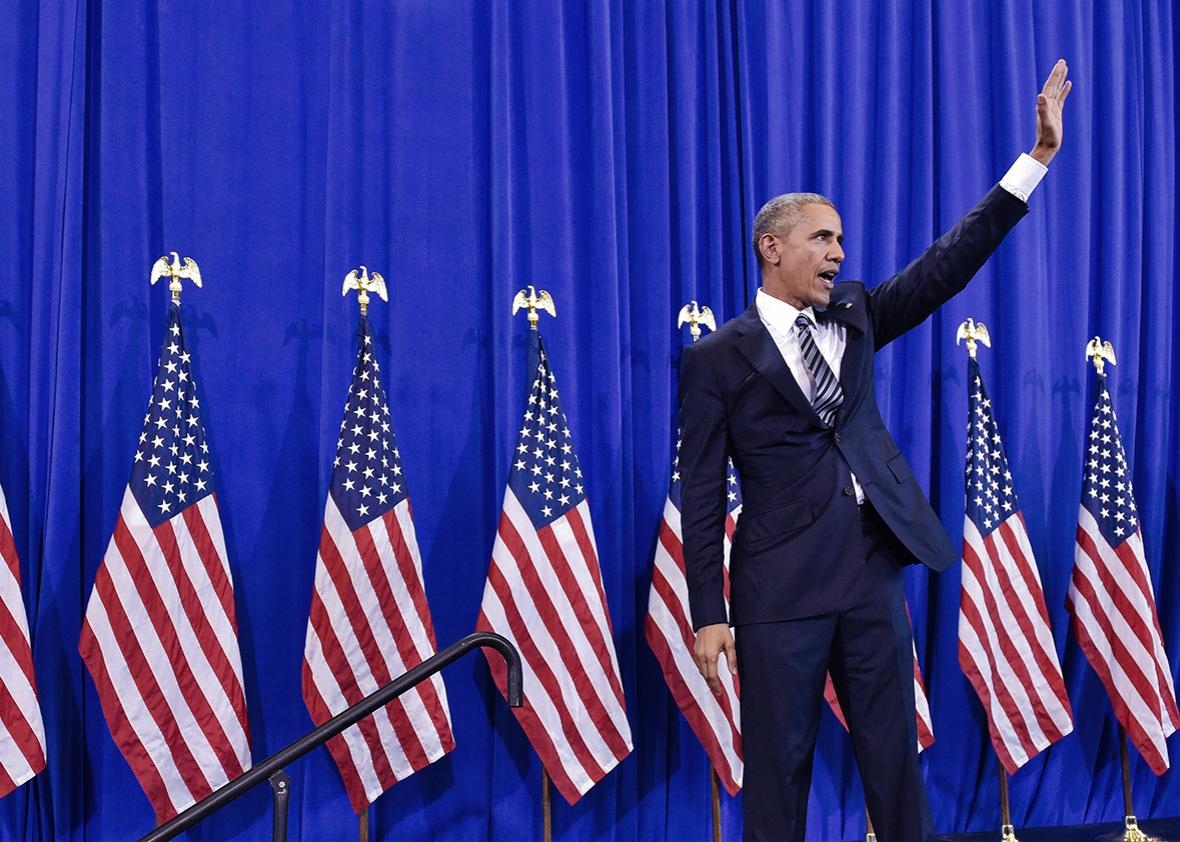President Obama on Tuesday delivered his final national security speech as commander in chief. The address had been planned well before the election, his deputy national security adviser, Ben Rhodes, had told reporters in advance. The intention was to summarize the things the president had accomplished and the guidelines that the next one, whoever he or she might be, would be wise to follow in the year ahead. But the unmistakable subject of the speech Obama gave in front of a crowd of servicemen and women at MacDill Air Force Base in Tampa, Florida, was the man he never actually named, Donald Trump.
Obama repeated the themes that he first laid out at his Nobel speech in November 2009: the need to use military force, even unilaterally, if the nation’s vital interests are threatened but—at the same time—the need to refrain from using force if our interests in the conflict are slight or if the military’s accomplishments can’t be sustained. (Obama’s Nobel Prize was, at best, premature and, in retrospect, a bit preposterous, but the speech was one of the most sophisticated essays on the imperatives and limits of power that any president has written.)
On Tuesday he applied those themes not only to a defense of his own policies of the past eight years but also to a series of jabs at his successor, warning him that his remarks about Muslims, his denial of climate change, and his intolerance of criticism violate America’s principles and aid its enemies. The audience applauded—some whoopingly so—at both the defenses and the jabs.
It was toward the end of his 40-minute address, while outlining seven principles for the future fight against terrorism, that Obama, in effect, unloaded on Trump. The terrorists’ goal, Obama said, is “to scare us into changing who we are and the nature of our democracy,” adding, “they cannot destroy our way of life, but we can do it for them if we lose sight of who we are.” In particular, he touted his abandonment of torture, “including waterboarding,” noting, “at no time has anyone told me that doing so has lost us good intelligence.” Civilian courts have also done a better and faster job than military tribunals of trying and convicting terrorist suspects. In other words, he said, “We can get the terrorists and stay true to who we are.”
Obama also stressed the need to uphold civil liberties. “Terrorists want us to turn on one another,” he said. “Protecting liberties is something we do for all Americans not just some.” He said, explicitly, that liberties extend to American Muslims, “including many who wear the uniform,” as much as they extend to anyone. “The United States of America is not a country that imposes a religious test” or requires identification cards.
And, he added, it’s a country where we “can criticize a president without retribution.” Just hours before the speech, Trump called for the cancellation of a contract for Boeing to build a new Air Force One—after reading a news report that Boeing executives had criticized his trade policies.
Finally, in laying out the various causes of sectarian insurgencies and terror, Obama mentioned the effects of man-made climate change on conflicts over increasingly scarce resources, including food and water. Trump has famously said that climate change is a hoax invented by the Chinese, though he reportedly discussed the issue earlier this week with former vice president and climate activist Al Gore, who said afterward that the conversation was “extremely interesting.”
To the principles laid out in his Nobel Prize address, Obama added a warning to keep the terrorist threat “in perspective.” Their threat is real, he said, “but they’re not the vanguard of a new world order. They’re thugs and murderers, and they should be treated that way.” They’re not remotely “an existential threat,” he added, as the fascists were before and during World War II or the Communists during the Cold War—and to behave otherwise “elevates” them, makes them stronger and more attractive to the discontented than they really are.
In conversations with journalists and politicians, Obama has often expressed concern about this exaggeration—noting that, statistically, people have a much greater chance of dying in their bathtubs than in a terrorist attack—and the chance that the resulting public fear could goad a president (even no-drama Obama) into taking unwise actions. It’s a fair bet that he is deeply worried that President Trump—so easily goaded and so unaware of power’s limits—will take those unwise actions at the slightest provocation.
